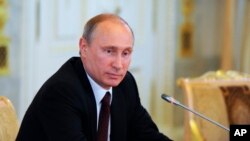MOSCOW —
For the last two months, Russia has armed and encouraged the pro-Russian rebels in southeastern Ukraine. Now, the Kremlin is undergoing a policy shift.)
On Monday, Russian state television showed a live broadcast of a Russian-supported Ukrainian separatist unexpectedly announcing a cease-fire.
Russian state TV followed with Russia’s Ambassador to Ukraine, Mikhail Zurabov, lecturing the rebels.
He said the rebels’ goals should be “first of all, achieving a sustainable truce and sustainable peace, including the non-resumption of fire, and, second, launching an inclusive negotiation process."
In the face of Western sanctions, Russia’s government seems to be preparing the Russian people and the pro-Russian rebels for a winding down of the southeastern Ukraine’s two-month-old secessionist war.
Russian President Vladimir Putin signaled the new policy Sunday when he praised the cease-fire of Ukraine’s new President Petro Poroshenko.
He said that “President Poroshenko announced a truce that is without a doubt an important part of a final settlement.”
After this rare praise for Ukraine’s president, Putin then turned to the rebels, who had ignored the Ukrainian government’s cease-fire appeal.
He said “it should be added that all fighting should stop.”
The next day, Ukraine’s government reported the rebels in Donetsk stopped shooting.
Heavy Western influence seems to be behind this new Kremlin pressure on the rebels to stop fighting and to start talking.
On Monday, President Obama called President Putin. The White House said Obama warned that more sanctions are in store if Russia continues to arm the rebels.
In recent days, British, German, and European Union officials also warned Russia that heavier sanctions will be discussed by EU leaders at a meeting in Brussels on Friday.
In Moscow, EU Ambassador to Russia, Vygaudas Usackas, said in a Monday interview that he hopes that is not necessary.
“I hope we will not be in need to adopt extra sanctions towards Russia. But now the call is upon them to deliver, with respect to political support and delivering on the necessary -- cease-fire, disarmament and border control,” said Usackas.
Putin faces a tricky balancing act -- edging away from the rebels without angering Russian nationalists and without losing a card to play in Ukrainian politics.
To project a warlike image, Putin ordered on Saturday a snap military drill of 65,000 soldiers in Central Russia. So while Russia’s president was pushing Ukraine’s rebels into peace talks, state television showed video of Russian soldiers on full battle alert.
On Monday, Russian state television showed a live broadcast of a Russian-supported Ukrainian separatist unexpectedly announcing a cease-fire.
Russian state TV followed with Russia’s Ambassador to Ukraine, Mikhail Zurabov, lecturing the rebels.
He said the rebels’ goals should be “first of all, achieving a sustainable truce and sustainable peace, including the non-resumption of fire, and, second, launching an inclusive negotiation process."
In the face of Western sanctions, Russia’s government seems to be preparing the Russian people and the pro-Russian rebels for a winding down of the southeastern Ukraine’s two-month-old secessionist war.
Russian President Vladimir Putin signaled the new policy Sunday when he praised the cease-fire of Ukraine’s new President Petro Poroshenko.
He said that “President Poroshenko announced a truce that is without a doubt an important part of a final settlement.”
After this rare praise for Ukraine’s president, Putin then turned to the rebels, who had ignored the Ukrainian government’s cease-fire appeal.
He said “it should be added that all fighting should stop.”
The next day, Ukraine’s government reported the rebels in Donetsk stopped shooting.
Heavy Western influence seems to be behind this new Kremlin pressure on the rebels to stop fighting and to start talking.
On Monday, President Obama called President Putin. The White House said Obama warned that more sanctions are in store if Russia continues to arm the rebels.
In recent days, British, German, and European Union officials also warned Russia that heavier sanctions will be discussed by EU leaders at a meeting in Brussels on Friday.
In Moscow, EU Ambassador to Russia, Vygaudas Usackas, said in a Monday interview that he hopes that is not necessary.
“I hope we will not be in need to adopt extra sanctions towards Russia. But now the call is upon them to deliver, with respect to political support and delivering on the necessary -- cease-fire, disarmament and border control,” said Usackas.
Putin faces a tricky balancing act -- edging away from the rebels without angering Russian nationalists and without losing a card to play in Ukrainian politics.
To project a warlike image, Putin ordered on Saturday a snap military drill of 65,000 soldiers in Central Russia. So while Russia’s president was pushing Ukraine’s rebels into peace talks, state television showed video of Russian soldiers on full battle alert.




